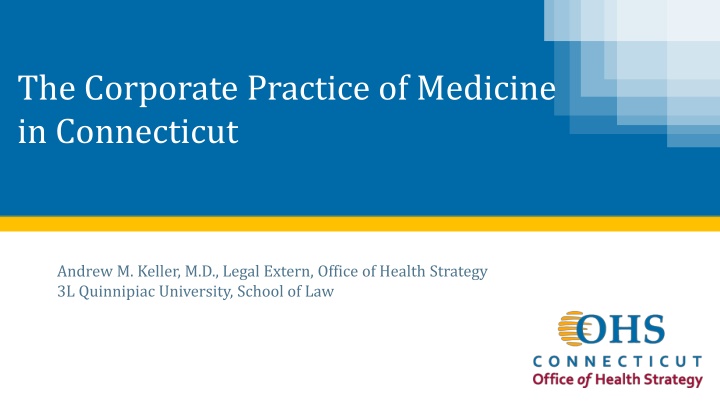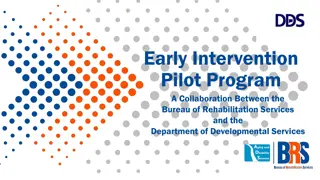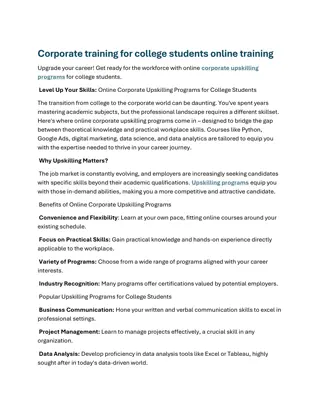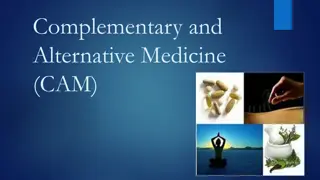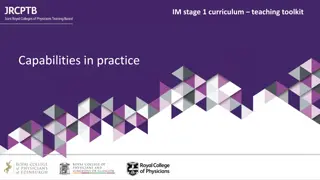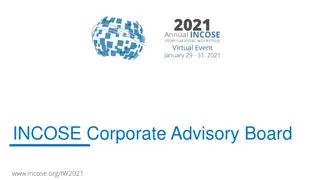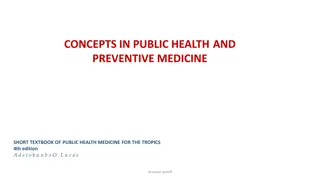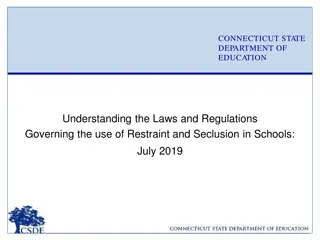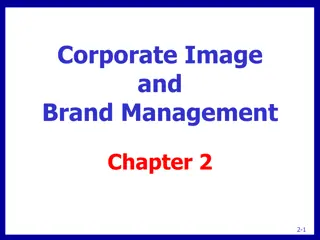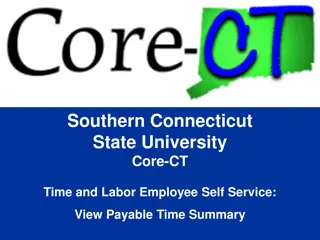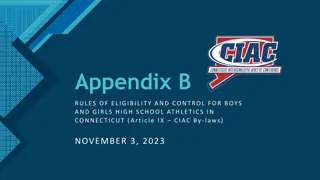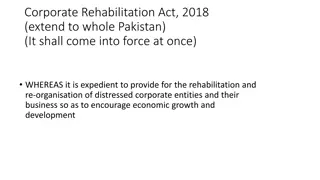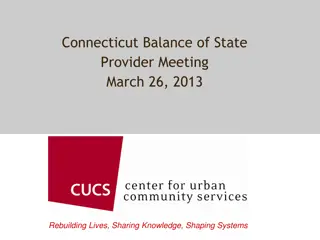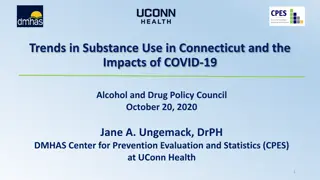Corporate Practice of Medicine in Connecticut: Overview and Regulations
The Corporate Practice of Medicine doctrine (CPOM) in Connecticut prohibits corporations from practicing medicine and requires all members of medical corporations to be licensed. Various agencies and offices in Connecticut play key roles in overseeing CPOM, including the Department of Public Health, Office of Health Strategy, and Office of the Attorney General. Fundamental statutes define who may practice medicine and the incorporation of physicians in the state.
Download Presentation

Please find below an Image/Link to download the presentation.
The content on the website is provided AS IS for your information and personal use only. It may not be sold, licensed, or shared on other websites without obtaining consent from the author.If you encounter any issues during the download, it is possible that the publisher has removed the file from their server.
You are allowed to download the files provided on this website for personal or commercial use, subject to the condition that they are used lawfully. All files are the property of their respective owners.
The content on the website is provided AS IS for your information and personal use only. It may not be sold, licensed, or shared on other websites without obtaining consent from the author.
E N D
Presentation Transcript
The Corporate Practice of Medicine in Connecticut
Outline Definition Regulatory oversight Legislated statutes The corporate practice of medicine in neighboring states
Definition The corporate practice of medicine doctrine (CPOM), Derives from American common law, Which has roots in English law and has been developed in the United States by our courts Where legal decisions are based on custom, morality, and precedent grounded in common sense (R. Satter, Under the Gold Dome 259 (2nd ed. 2009)). The CPOM doctrine is generally held to specify that: A corporation (or other corporate entity) may not be licensed to practice medicine All members/partners of a professional corporation (or limited liability corporation) formed to practice medicine, must be licensed in that field For-profit corporations cannot form or own any part of a professional corporation
Roles of Connecticut Agencies and Offices in CPOM Department of Public Health (DPH) Licenses and regulates physicians, hospitals, and ambulatory facilities (among others) Conducts investigations into potential violations of standard of care, regulation, or law that may lead to discipline Office of Health Strategy (OHS) Medical foundations must notify OHS when formed (C.G.S. 33-132bb(f)) Notifications include filing of the Certificate of Incorporation (and amendments) Receives annual reporting from all Medical Foundations (C.G.S. 33-132bb(g)) Office of the Attorney General (OAG) Reviews transfers of ownership of certain medical practices, hospitals, and medical foundations (C.G.S. 19a-486i) Receives and reviews notices of material change submitted by (among others) medical foundations (C.G.S. 19a-486i)
Fundamental Statutes Defining the Practice of Medicine C.G.S. 20-9(a) defines [w]ho may practice medicine or surgery No person shall . . . diagnose, treat, operate for or prescribe for [any disease] nor practice surgery, until he has obtained . . . a license . . . only in the kind or branch of practice stated in such license. Sub (b) provides a list of individuals to whom the medicine and surgery chapter of the general statutes does not apply C.G.S. 19a-19 DPH is preempted from the direct regulation of the business practice and ownership of medicine The Department shall not adopt any regulation concerning business practices . . . [including] ownership of a regulated practice . . . [and] practice in an association, partnership, corporation or other lawful entity.
Fundamental Statutes Defining the Incorporation of Physicians Two Connecticut statutes define the incorporation of physicians C.G.S. 33-182a, et seq. Professional Services Corporations (PC) (1969) C.G.S. 34-243, et seq. Uniform Limited Liability Company Act (LLC) (1993, revised 2017) In the context of an organized entity for the practice of medicine, these statutes require that: Corporate entities are organized solely for delivery of professional services The professional services must be of the same license type The shareholders must be Connecticut licensed practitioners These statutes effectively prohibit the CPOM in a PC or LLC. However . . .
Fundamental Statutes Defining Medical Foundations In CT, Medical Foundations are a carveout to the prohibition against the CPOM C.G.S. 33-182aa, et seq. Medical Foundations ( MF ) (2009) Sub (a) provides a mechanism for nonprofit health care entities to organize and become a member of a nonprofit MF Sub (b) allows IPAs, PCs, LLCs, registered in Connecticut to organize and form a (for-profit or nonprofit) MF, but At least 60% of ownership and control must be by that organizing corporate entity The MF must be formed to render professional medical services only Each shareholder of the MF must be a licensed physician No entity in sub (a) may own or control a sub (b) MF Sub (d) requires that no for-profit entity or employee may serve on the BOD of a MF Sub (d) also requires that no nonprofit entity or employee may be on the board of a sub (b) MF organized by a for-profit entity. In 2013, Public Act 13-278 passed the General Assembly and would have allowed for-profit or out-of-state entities to be members of MFs, but it was was vetoed by the Governor For more information see Connecticut Office of Legislative Research report 2013-R-0262.
CPOM in Neighboring States Massachusetts: physician may practice in nonprofit service plan that may not restrict methods or treatments. (Mass. Gen. Laws ch. 176b, 7) New Jersey: May be a for-profit corporation employing or renumerating physicians. (N.J. Admin. Code 13:35-6.16) New York: Only nonprofit university faculty organization, indemnity corporations and hospital service corporations may employ a physician. (N.Y. Educ. Law 6527(1) and N.Y. Not-for-Profit Corp. Law 1412) Rhode Island: A nonprofit entity controlled entirely by licensed physicians is legal even if a non-voting non-physician director is on the board as the control of the delivery of medical services remains with the physicians. RIH Med. Found., v. Nolan 723 A.2d 1123 (1999)
Conclusion In Connecticut, the CPOM through Medical Foundations: Is a legislative carveout to the prohibition on the CPOM Is permitted pursuant to complex rules that depend on the for- profit or nonprofit status of the organizing entity Has restrictions on who may be on the board of directors of the foundation Is allowed, provided the practice of medicine remains with the providers and not the forming corporate entity
